Translations by Eli Siegel
Some Lines from Voltaire’s Poem on the Disaster at Lisbon, By François Marie Arouet de Voltaire
1. Will You Say This?
Will you say, “It is the effect of everlasting laws
Which necessitates this choice by a free and good God”?
Will you say, seeing this heap of victims:
“God is avenged, their death is the payment of their crimes”?
What crimes, what bad things have been committed by these children,
Lying on the breasts of their mothers, flattened and bloody?
Lisbon, which is a city no longer, had it more vices
Than London, than Paris, given to doubtful delights?
2. We Are Not Oaks
If the eternal law which moves elemental things
Makes rocks fall, by the efforts of great winds,
If thickly growing oaks are burned by lightning—
They do not feel the blows which bring them down,
But I live; but I feel; but my heart, deeply hurt,
Asks for help from the God who made it exist.
3. God Is Asked About
What eye may see into his deep designs?
From a Being all perfect, evil cannot come to be.
It does not come from another, since God alone is master.
Yet, evil exists. O sad truths!
O astonishing mingling of contrarieties!
A God came to console our afflicted race;
He visited the earth, and has not changed it.
4. Why Cannot This Be?
Whatever opinion one has, one should shudder, no doubt.
There is nothing one knows, and nothing one does not question.
Nature is mute, she is questioned in vain.
There is need of a God who talks to humanity.
It is for him only to explain his work,
To console the weak, make the wise person clear.
5. What Can Man Do?
What can then do, the mind of largest range?
Nothing. The book of fate closes itself before our eyes.
Man, a stranger to himself, by man is not known.
What am I, where am I, where do I go, and from what do I come?
Atoms tormented on this mass of mud,
Whom death engulfs and with whom fate plays—
But thinking atoms, atoms whose eyes,
Guided by thought, have measured the skies.
From the very midst of the infinite, our lives go forth,
Without our being able, one moment, to see ourselves or know ourselves.
6. Voltaire Tells of a Caliph
A caliph once, at his last hour,
To the God whom he adored, said, for all prayer:
“I carry to you, O Only King, Only Unlimited Being,
All that which you don’t have in your immensity—
Deficiencies, regrets, evils and ignorance.”
But he might, also, have added: Hope.
7. This Was Earlier in the Poem
What is needed, O mortals? Mortals, it is needed that we suffer,
Submit ourselves silently, adore, and die.
8. This Is in a Note
O God, give us a Revelation that we should be humane and tolerant.
From Hail, American Development (Definition Press)
© 1968 by Eli Siegel



Eli Siegel’s note to the poem:
Some Lines from Voltaire's Poem on the Disaster at Lisbon. 1967. Voltaire and Simonides are so different in the poem we are now considering and in the poem before. Simonides sees something so right in Thermopylae: what happened there in 480 B.C. Such historical composure Simonides has; such acceptance of the universe as occurrence. But Voltaire argues. The Lisbon earthquake of 1755 is not something to be resigned to, unquestioning about, says one of the most alert men of all history. Voltaire, though, is poetic too. He doesn't have the brief, undying grandeur of Simonides, but in the lines on Lisbon, Voltaire shows he is poetic Voltaire. Grace, music, largeness, surprise, wit—and, again, auditory loveliness are in the Lisbon lines. Voltaire and Simonides have both complied with the Muses' pleasing monitions.